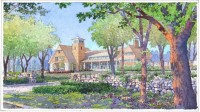Divided Sentiments Over Brynwood Plan at No. Castle Public Hearing

North Castle residents were divided over Brynwood Golf & Country Club’s proposed condominium and golf course redesign project at the opening of the twin public hearings last week on the Draft Environmental Impact Statement and requested rezone.
For about two hours the town board listened to close to 20 residents who spoke at the June 27 hearing at H.C. Crittenden Middle School where nearly equal levels of applause followed speakers regardless of which side of the issue they supported.
Those who favored the proposal for 88 age-targeted luxury condominiums at the 156-acre property on Bedford Road spoke of how the project would save the golf course from future development, generate extra tax revenue for the town and Byram Hills School District and provide another choice for local empty nesters and retirees who want to move out of larger houses but stay close to family.
Opponents questioned the developer’s assertions that the proposed community would have little impact on traffic and produce just six additional school-age children. Some also addressed the unfairness of having residents pay about half the taxes than they would in single-family houses of similar value. The Brynwood partners have projected the mostly two- and three-bedroom units would sell for between $1 million and $1.8 million.
In New York State, condominiums are taxed at a much lower commercial rate compared to single-family homes.
“Some people have a fear of change,” said Armonk resident Steve Buschel, a supporter of the plan. “That’s the wrong way to look at this. Change done properly is something that will advance our community and make it better. Change is to be embraced and not feared.”
But others argued that if the developer is allowed to have the property rezoned and receives site plan approval from the planning board it would have a negative fiscal impact on North Castle and put further pressure on area roads and services.
“I work really hard to pay my taxes and I think that it’s unfair that other people, for no reason, pay less than their fair share,” said resident Amy Zipper addressing the property tax issue.
Resident Stan Simon, another opponent, said he felt the traffic issue was inadequately addressed in the DEIS. While the developer contends that the already overcrowded Route 22 would see little change during rush hour because most of the residents would be retired, Simon stated that motorists are already using alternate routes to avoid Route 22. That situation would only worsen with more cars.
“I see a significant increase in the number of cars on both Thornewood Road and Long Pond Road during peak traffic periods,” he said. “More significantly, I’ve seen a major increase in speeding on both of those roads at the time when children are going off to school and are being dropped off.”
Middle Patent Road and Banksville Road are also experiencing heavier traffic because of drivers looking to avoid Route 22, said Simon.
Windmill Farm resident Stuart Kovensky outlined a wide ranging list of problems he had with the application, highlighted by the fact that the units would be taxed as condominiums, not fee simple single-family houses.
He also was skeptical of the developer’s estimates of only six students that would be generated by the project for the school district and questioned the viability of the golf course even under the new arrangement. The trend of golf clubs closing in the region and throughout the country makes Brynwood’s projections of $1.4 million in tax revenues, about $500,000 of which would be generated by the golf course, suspect, Kovensky said.
“They get to sell more units at much higher prices with about half of the taxes,” Kovensky said. “We get significantly more crowded roads, more crowded schools, lower tax revenues when our (town) budget is extremely constrained. So they get to high-five each other while the town walks away. I don’t think that’s fair for the rest of the town’s residents.”
But other residents urged the town board to strongly consider the requested rezone to allow for the golf community. Armonk resident Frank Benish was one of several speakers who said he was impressed with Brynwood’s plans, which would save the 140-acre golf course from future development. The Brynwood partners have stated previously that if this application is shot down they would likely pursue 49 single-family houses, which the zoning allows.
“It would be unfortunate if we let a vocal minority hijack this process and the project dies,” Benish said. “And we still may get Mega Mansion Village.”
Another resident, Karen Davis, said she looked forward to the possibility of moving into a community after she and her husband sell their house that would allow them to remain close to family.
Attorney Mark Weingarten, representing Brynwood, said the perceived tax inequity is a tool used by the state to encourage diverse housing stock.
He also said that even if there were triple the number of students living at Brynwood than what was projected it would bring in hundreds of thousands more revenue to the school district. It is estimated that the project would generate about $1 million a year in revenue for Byram Hills. Currently, the cost per student is about $27,000 annually.
The public hearing will continue as part of the North Castle Town Board’s regular meeting on Wednesday, July 10.

Martin has more than 30 years experience covering local news in Westchester and Putnam counties, including a frequent focus on zoning and planning issues. He has been editor-in-chief of The Examiner since its inception in 2007. Read more from Martin’s editor-author bio here. Read Martin’s archived work here: https://www.theexaminernews.com/author/martin-wilbur2007/
